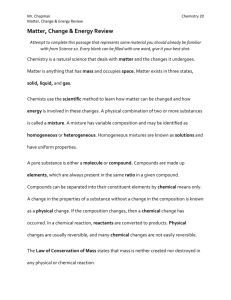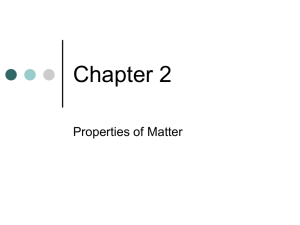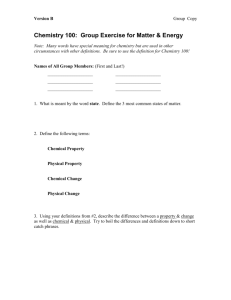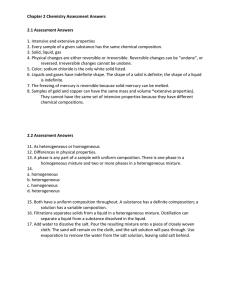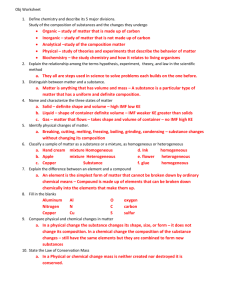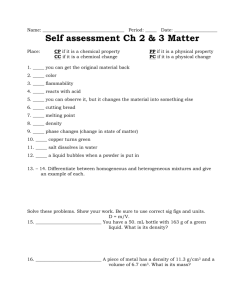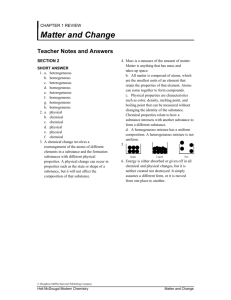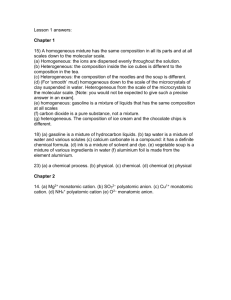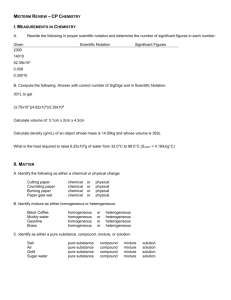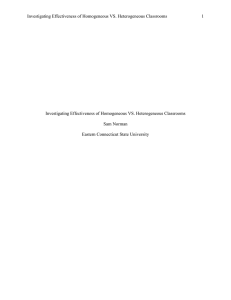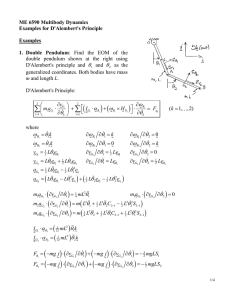GREAT CONCEPT SHEET! 1. Classify the following as physical or
advertisement
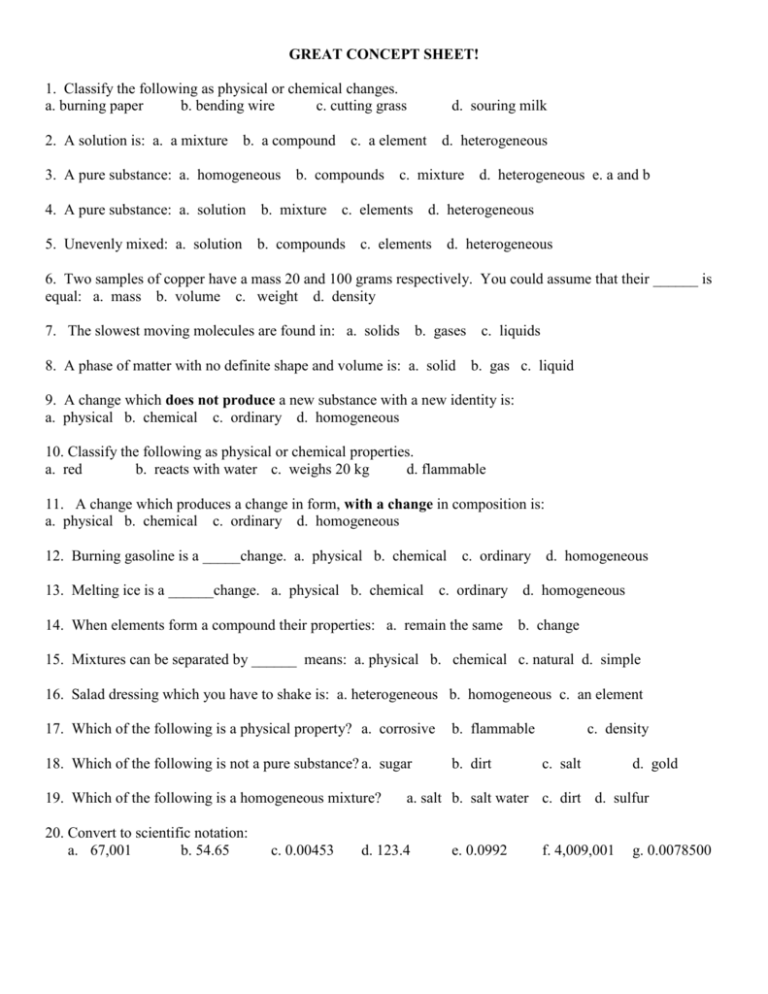
GREAT CONCEPT SHEET! 1. Classify the following as physical or chemical changes. a. burning paper b. bending wire c. cutting grass 2. A solution is: a. a mixture b. a compound 3. A pure substance: a. homogeneous d. souring milk c. a element b. compounds d. heterogeneous c. mixture d. heterogeneous e. a and b 4. A pure substance: a. solution b. mixture c. elements d. heterogeneous 5. Unevenly mixed: a. solution b. compounds c. elements d. heterogeneous 6. Two samples of copper have a mass 20 and 100 grams respectively. You could assume that their ______ is equal: a. mass b. volume c. weight d. density 7. The slowest moving molecules are found in: a. solids b. gases 8. A phase of matter with no definite shape and volume is: a. solid c. liquids b. gas c. liquid 9. A change which does not produce a new substance with a new identity is: a. physical b. chemical c. ordinary d. homogeneous 10. Classify the following as physical or chemical properties. a. red b. reacts with water c. weighs 20 kg d. flammable 11. A change which produces a change in form, with a change in composition is: a. physical b. chemical c. ordinary d. homogeneous 12. Burning gasoline is a _____change. a. physical b. chemical 13. Melting ice is a ______change. a. physical b. chemical c. ordinary d. homogeneous c. ordinary d. homogeneous 14. When elements form a compound their properties: a. remain the same b. change 15. Mixtures can be separated by ______ means: a. physical b. chemical c. natural d. simple 16. Salad dressing which you have to shake is: a. heterogeneous b. homogeneous c. an element 17. Which of the following is a physical property? a. corrosive b. flammable 18. Which of the following is not a pure substance? a. sugar b. dirt 19. Which of the following is a homogeneous mixture? 20. Convert to scientific notation: a. 67,001 b. 54.65 c. 0.00453 c. density c. salt d. gold a. salt b. salt water c. dirt d. sulfur d. 123.4 e. 0.0992 f. 4,009,001 g. 0.0078500 Determine the number of significant figures in each of the following numbers. Then, indicate what two numbers it falls between on the measuring device being used! (a) 24.5 grams (b) 540 liters (c) 0.52 centimeters (d) 98.4 kg (e) 15,000 milligrams (f) 566.0 mm (g) 3,400 meters (h) 2,000 Mg (i) 2452 nanoliters (j) 23.58 km (k) 70 grams (l) 44 ml (m) 15,000 liters (n) 190.05 ml (o) 5.7 grams (p) 443 mL (q) 100.1 g (r) 640,002 m (r) 473 ml (s) 20.020 g (t) 0.002 meter (u) 1,000,000 liters (v) 4,200 km (w) 0.0020 g (x) 0.10 liter (y) 1.0004230 g (z) 104.20 g Perform these calculations rounding off to the correct number of significant digits AND units (if applicable)! _______ 1. 8.54 + 143.1 _______ 2. (0.940 x 9700) x 8243 _______ 3. 500 (112.5 - 8.783) _______ 4. 54 x 407 _______ 5. 0.00035 x 44.9 6. 10 g /0.20 cm3= 7. 0.3658 g +5.3 g = 8. 23.45 g + 0.2300 g + 12000g + 0.00345 g = 9. 34.7 mL - 2088 mL - 456.003 mL - 130,000 mL = 10. 45.667 m x 23.3m x 12.00m x 2000m = 11. (0.00093 g/0.3800g) / (140.0g / 0.000004g) = 12. (13.22 cm x 20.0 cm) / (34500 cm x 0.000013 cm) = 13. (13.66 L2 + 22.4 L2)/(23000L x .00462L) = 14. (14.6 g - 16.996g) + (7.0023 g x 230,000) = 15. (13.667 mL2 + 20.0 mL2 + 3400 mL2) / 4.0mL = 16. (20300 m x 14.67 m x 0.0003 m) / 10000 m = 17. (23.004 mm x 103 mm x 400 mm) - (16.4 mm3) =
